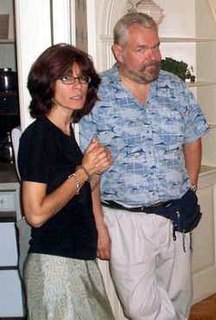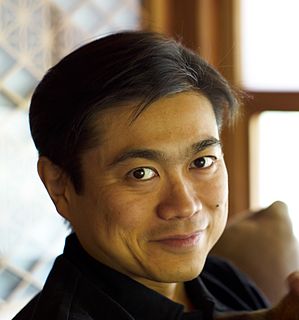A Quote by Kathe Koja
I have one rule when adapting any text: nothing gets added; all the words are the original author's own. But in the ordering and recreation of the story, I can do as I please, and to me, the heart and the point of 'Dracula' is appetite.
Related Quotes
I'll give you the sole secret of short-story writing, and here it is: Rule 1. Write stories that please yourself. There is no rule 2. The technical points you can get from Bliss Perry. If you can't write a story that pleases yourself, you will never please the public. But in writing the story forget the public.
As a child, I saw this beautiful film, Dracula's Daughter, and it was with Gloria Holden and was a sequel to the original Dracula. It was all about this beautiful daughter of Dracula who was an artist in London, and she felt drinking blood was a curse. It had beautiful, sensitive scenes in it, and that film mesmerized me. It established to me what vampires were?these elegant, tragic, sensitive people. I was really just going with that feeling when writing Interview With the Vampire. I didn't do a lot of research.
Illustrations have as much to say as the text. The trick is to say the same thing, but in a different way. It's no good being an illustrator who is saying a lot that is on his or her mind, if it has nothing to do with the text. . . the artist must override the story, but he must also override his own ego for the sake of the story.
Please tell me a story about a girl who gets away." I would, even if I had to adapt one, even if I had to make one up just for her. "Gets away from what, though?" "From her fairy godmother. From the happy ending that isn't really happy at all. Please have her get out and run off of the page altogether, to somewhere secret where words like 'happy' and 'good' will never find her." "You don't want her to be happy and good?" "I'm not sure what's really meant by happy and good. I would like her to be free. Now. Please begin.
The meaning of a work is not what the author had in mind at some point, nor is it simply a property of the text or the experience of a reader. Meaning is an inescapable notion because it is not something simple or simply determined. It is simultaneously an experience of a subject and a property of a text. It is both what we understand and what in the text we try to understand.
The discourse on the Text should itself be nothing other than text, research, textual activity, since the Text is that social space which leaves no language safe, outside, nor any subject of the enunciation in position as judge, master, analyst, confessor, decoder. The theory of the Text can coincide only with a practice of writing.
I was in Los Angeles making 'Dead Again' and the producer, Lindsay Doran , asked me if I'd be interested in adapting this book, .. Austen is my favorite author and I thought, 'Well, of course, I'd be very interested, but I don't know how. I don't know where to start, A, writing a screenplay and B, sort of adapting it from a great novel.
I never know who's influencing me at any time. I mean, I can take a play by Brecht and adapt it, I'm consciously adapting that play, or, as I've done with the Greek classics, Euripides and Oedipus, and I'm consciously adapting that play. Whether it influences me or not, I think it's the critics, the analysts who have to decide that. Me, I don't feel that I'm under the influence of any such sources.





































